In 2021, there were about a million fathers who live apart from their children. About 30% of those dads live with a partner who has other children from previous relationships. Here are our ideas on how to still be the best father you can in what can be tricky circumstances.

Here at Dad.info we have an online forum where many of the posts are from dads who have been separated from their children following a relationship breakdown. You are welcome to come and join us there and be part of the conversation.
Father’s rights and parental responsibility
None of the information below is legal advice; consult a mediator or solicitor for the latest legal situation.
Responsibility for the children

Whether you have the right to have a say over major decisions regarding your children after a separation depends on whether or not the law recognises you as having “parental responsibility”.
If you were married to the mother at the time of birth, or you were not married but you were named as the father on the birth certificate, you are recognised in law as having “parental responsibility”.
Unmarried fathers who were not on the child’s birth certificate do not have an automatic right to have a say over major decisions in a child’s life unless they are recognised in law as having parental responsibility. This means that the child’s mother can make decisions about your child’s upbringing without consulting you. However, you are still required by law to provide financial support for your child.
Depending on a number of factors, fathers do not have an automatic right to contact with their children after separation from the mother even if they were married to the mother.
Unmarried fathers: legal rights and parental responsibility

The rights of a dad to have any say over the upbringing of their child is created by the father establishing legal parental responsibility. Parental responsibility gives a father the legal right to have a say over key decisions in a child’s life such as:
- where the children should live
- where they go to school
- making medical decisions for them
- changing their surname
If a man is not married to the mother of his children, and his name is not on the birth certificate of his child; he will have to establish legal parental responsibility.
Establishing legal rights and parental responsibility if you are unmarried
Whether married or not, fathers are expected to provide financial support to their children even without regular contact.
If the parents are married to each other, fathers automatically have parental responsibility after the baby’s birth.
However, a father who is not married to the mother and does not have his name on the birth certificate of his child may need to go through mediation in order to gain parental responsibility.
If fathers are not able to reach an agreement, fathers can turn to mediation, and to family courts.
Fathers who withhold financial support
Many fathers feel that if they are denied the right to see their children by their mother they do not have to pay child support.
However, the mother can apply to family courts to force the father to pay even if she is denying access.
If a father makes no attempt to pay for his child’s upbringing and deliberately withholds money from the mother, fathers will generally have difficulty getting their visitation rights enforced. The mother has the right to take the father to court and force payment whether he is seeing his child or not.
Child maintenance

Many separating couples are able to come to an informal agreement regarding child arrangements, child support and visitation. If you want to find out more about this check out the government guidelines here:
Sometimes this is not possible and couples have to get the Government Child Maintenance Service involved:
Understanding how the child maintenance service works
The Child Maintenance Service took over from the Child Support Agency following years of difficulty due to the increasing complexity of supporting parents and children after family breakdown.
Child maintenance is complicated and it is important that you obtain up to date legal advice for your specific situation.
In essence they look at the gross income of the paying, non-resident parent – usually the father – and assess a monthly amount based on:
- His income
- The number of children he is paying for
- How many nights the father provides “shared care”
The CMS has considerable enforcement power. If the paying parent is employed but does not pay child maintenance they can send his employer a “Deductions from Earnings Order” so that his salary is docked at source.
You can appeal the amount the CMS is asking for here:
However the CMS can add interest to any amount they deem to be outstanding, whether it is being disputed or not, and they can backdate their demands.
You can find the calculator here:
The fathers must complete a CSA1 Form if they want to help with any financial support that fathers are expected to provide for their children.
To find out more about parental responsibilities for the father go to the government website here:
When do CMS payments stop?
Legally you are required to pay Child Maintenance until your child either:
- Leaves education at the age of 18: the school leaving age was raised to 18 from September 2015. “School” would include further education such as an apprenticeship
- Reaches the age of 20 while in approved education of at least 12 hours per week
Visitation rights
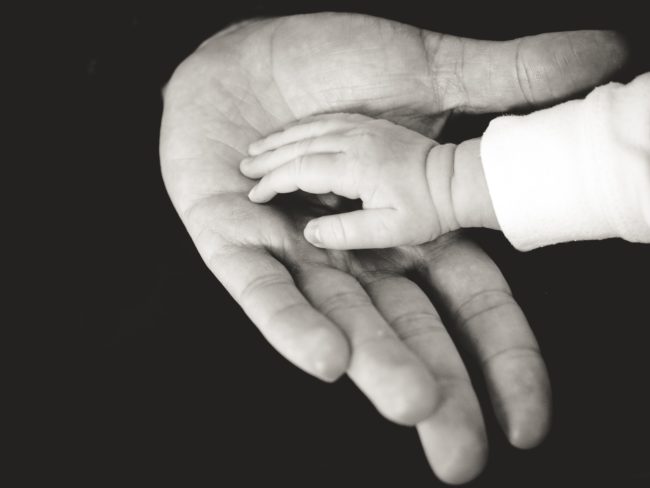
It is often a shock to separated fathers to learn that they do not necessarily have a legal right to visit their children.
Sometimes it can seem that the family courts are heavily rigged against fathers. However, the system is designed to protect the vulnerable. Sadly, a woman is murdered every 48 hours by a partner or ex-partner in the UK, and some fathers even murder their own children. Over 90% of such child killers have no record of domestic violence.
The courts have this very much in mind when making decisions about the safety of the mother and the children. You may be horrified that they look at you that way but they aim to put the safety of the children first. An angry text sent to your ex after a few beers can be very damaging to your case when shown to a family court in the cold light of day.
What can I do if my ex denies me access to my child?
When couples separate, there may be conflict over what is to happen to the children.
It isn’t uncommon for mothers to want to stop the child visiting the father if for example he is:
- behind on child maintenance
- always late to the pickup
- has a new partner
However, if there is a child arrangement order in place she may be in breach unless she applies to change the order before she stops contact. It may be best to seek the help of mediation experts who can often negotiate between the two parents.
If there isn’t a child arrangement order you may want to apply for one as the first step to restoring – or even improving – your visitation rights.
There are several steps a father could take before taking the mother to court:
STEP 1
Get a letter from a solicitor to explain what you would like to achieve, why you think it is important for your children to have a relationship with you and the legal requirements for visitation
STEP 2
If the solicitor’s letter doesn’t work, you can try mediation
STEP 3
If mediation also doesn’t work you could apply to court for a Child Arrangements Order.
What if I already have a Child Arrangements Order and am still being denied access?
You can apply to a court for enforcement. This can include your partner being fined or given community service, but it’s best to try to resolve it without going to court since enforcement is likely to increase hostility between you and harm your children. Options could include:
- Involving other family members to talk to your ex on your behalf
- Getting your solicitor to write and set out proposals to resolve the situation, and to remind her of the legal situation regarding your Child Arrangement Order.
Managing stress levels and anger about injustice

It isn’t uncommon for a father to claim their ex has fabricated accusations against him in order to stop him from seeing his children. There is no easy way around this but it can only help your case if your actions and words, including text messages, reflect a clear message that you are putting your children first and honestly seeking to support them.
This is why it is important if you did not want this separation to happen to speak to your doctor and get help in managing your stress levels and to actively seek the assistance of professional mediators when discussing such things as visitation rights.
What if a child says they don’t want to see a parent
If there is a Child Arrangement Order in place, both parents must stick to it since a court has made it in the interests of the child. It is tempting for the primary carer to say “I don’t want to force them to go” but except for exceptional circumstances the law regards it as beneficial to children to have contact with both parents.
It is very common for children to say this because of the uncertainty if the separation is recent. Or it may be that what they find difficult is the transition between the two households. In both situations they are fine once they are actually with the other parent. We call this the Transition Bridge. We cover the transition bridge later in this article.
To understand this in more depth you can sign up to our free online “Parenting After Separation” course.
Children Are People Pleasers
Another common reason a child may say they don’t want to visit the father is because there is hostility between the two parents and the child wants to please the mother, or doesn’t want to leave her alone.
This is when it is a good idea for both parents to cooperate to understand what the problem is and to aim to resolve it together and encourage the child to be honest about what the problem is. It could simply be that one household is stricter than the other, or it could be that an older child really wants to spend more time with their friends. This is a natural part of growing up.
Parental Alienation
However, sometimes it is the case that one parent has deliberately turned the child against the other parent not just in the heat of the immediate split but over a long protracted period. This is called “Parental Alienation”. CAFCASS defines parental alienation as:
“when a child’s resistance or hostility towards one parent is not justified and is the result of psychological manipulation by the other parent.”
This is a controversial idea, and difficult for family courts to assess but it is something that social workers may look for, taking many things into account including how close the relationship was prior to the breakup.
Common Specific Issues and Specific Issue Orders when parents cannot agree
There are specific issues that often arise after separation on which the parents cannot agree. For these circumstances the law allows for parents to apply to family courts for a “Specific Issue Order”. Specific Issue Orders are also known as “Section 8 Orders”
Can I take my child abroad on holiday?

It is best to get the advice of a solicitor regarding your specific situation before taking your child abroad on holiday if you are the non resident parent; even if you have parental responsibility in law.
In most cases it is the mother who is the primary caregiver, and who has residency. This means that the father must get the mother’s permission if fathers want to take the children abroad. A father who takes his child abroad on holiday without that permission could be taken to court for child abduction, which is a serious offence.
If the mother, being the primary caregiver, wants to take the child on holiday and the father objects, it is a bit more complicated, relating to factors such as court orders in place, and may require legal advice on their specific circumstances.
The father would need a really good reason that a family court might agree with, he could apply to court for a “specific issue order” or “prohibited steps order” to stop the child being taken on holiday. If the court grants the order then the mother could be taken to court if she does take the child on the prohibited holiday.
Can I stop my ex’s new partner from spending time with my children?
It is often the case that either the mother or the father does not want their child to be around the new partner of their ex. However, if both parents have parental responsibility they cannot stop their children from seeing the new partner unless there were grounds for a Family Court to agree it would be unsafe.
Other situations when specific issue orders might be needed
- When one parent wants to change the child’s surname
- Decisions on a child’s education and what school they should attend
What is mediation?
Mediation is an informal way for separating couples to try to reach an agreement on the arrangements that will be made for their children, property, and financial support.
If the parents cannot agree on arrangements for their children by themselves, they will be referred to mediation.
Mediation is a legal way to work through any disputes that may exist between fathers and their children’s mother, which can include issues such as access rights, child support, or the fathers becoming the primary care giver.
Courts will also issue orders regarding these areas if mediation is unsuccessful.
In spite of how upsetting a separation can be, many couples are able to come to an informal arrangement which benefits them both. An informal arrangement, especially one negotiated with the help of an impartial mediator, can save both parents a lot of money. Often those arrangements will involve the non resident parent paying the resident parent directly rather than going through the Child Maintenance Service.
Mediation and married/divorcing/divorced parents
Before family courts can issue a court order requiring couples to attend mediation, both parties must be separated for six months and the divorce proceedings must have begun.
The couple may be required to go to mediation before beginning legal proceedings if their children are under 16 years.
Mediation and unmarried parents
A father may be able to gain access to the mediation process are through mutual consent with the mother, or by applying for a court order if the father wishes to gain parental responsibility against the mother’s wishes.
How to get started with mediation
Whether or not the father is married to the mother of his children it is often very helpful to go through mediation before applying to family courts. You can find a local mediator here.
Mediators can help parents to reach agreement on
- times and dates for meetings between fathers and children
- making any necessary travel arrangements
- financial arrangements
Mediators are not free. If you receive a low income you may be able to obtain legal aid here.
Often family courts require proof that parents have attempted mediation before applying to the court.
Mediation and travel costs when the father is distant
It can be difficult to come to an agreement about times and dates for visitation if the father lives some distance from the child. Inevitably there will be travel costs involved in getting the father and child together, and how these costs are covered may need to be included in mediation.
Family mediation – essential links
Co-parenting
When parenting falls into two different units
This circle below represents the emotional world for a child. His or her well-being is dependent upon this emotional world staying safe.
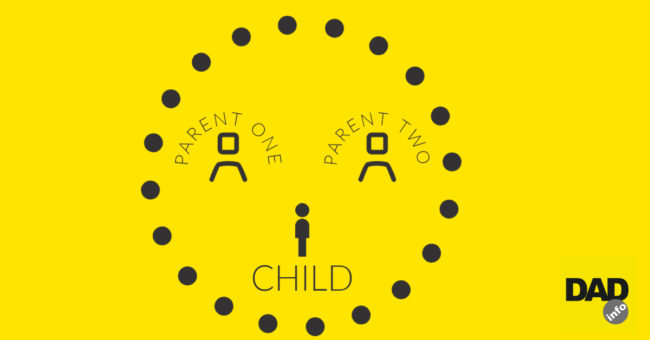
When a family splits it very naturally falls into two separate units.
This is understandable at the time of breakdown; its messy, people are hurt, and both partners need boundaries. Each home has a different feel, with different family and friends, different rules, different values, and different views about the other parent.
But where it becomes really harmful is when this goes on for years. In that situation you have the nightmare of “split parenting”. This is where the child has to cross a divide from one world with one parent into a separate world with the other parent.
The Transition Bridge between the two households
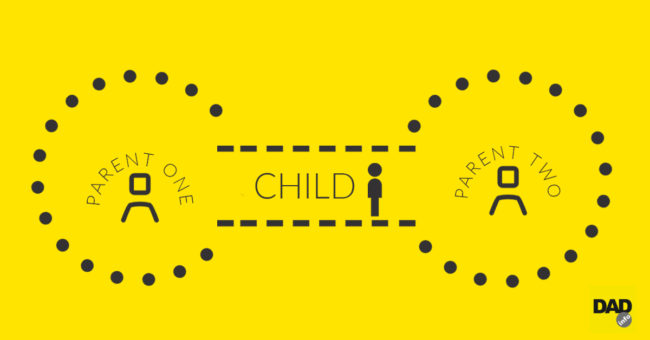
The gap in between those two worlds is a very lonely and scary place, and it crosses a void of hostility between the two worlds.
We call it the “transition bridge”.
If children say they don’t want to leave to go and be with the other parent, it may be because they don’t want to transition through this void of hostility again as they transfer from one world or the other.
Moving from split parenting to co-parenting
Leaving a child to grow up in an environment where there is bad feeling and poor communication between the parents throughout childhood can be devastating to the long term mental health of the child. Children and Family Court Advisory and Support Service refer to this as “toxic parenting”.
Instead, what children need is ‘co-parenting’. This is where parents work as a team, to care for the child, to make decisions, to discipline, and to share concerns.
Co-parents understand that the job of being a parent continues with the other parent, whether they are together or apart.
It can take time and patience to build a successful co-parenting relationship, and the start is just to take small steps, with clear boundaries. Where there is just the beginning of contact between the parents until ultimately they will end up with this:
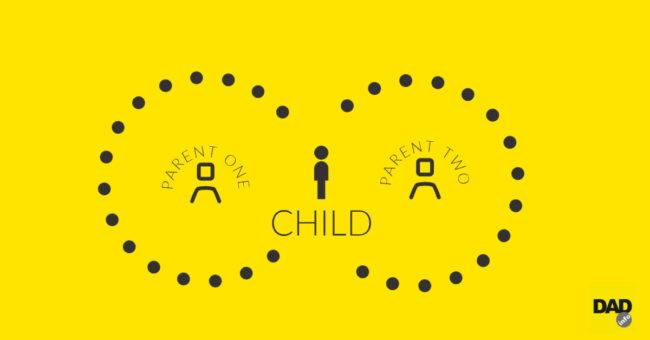
This is co-parenting; where you’ve got one parent and their world, and the other parent and their world, and they are separate spaces but there is open communication either way so the child doesn’t have to cross the the void of hostility. They commit to parenting this child together so the child is never anywhere that isn’t freely moving within the carers’ space.
Co-parenting is about using the term “We”.
What it looks like when parents communicate

For example you have a 14 year old daughter who wants to go out to a party wearing inappropriate clothes and you say “Hold on…I’m just going to have a word with your Mum”. So you call your ex to discuss it then come back and say “Mum and I have spoken and we agree you can go to the party but we both want you to get changed first”.
This avoids allowing the child to ‘play one parent off the other’ and provides a united parenting front, which is important for the child to be and feel safe.
Avoiding passive conflict between you
Even once the active conflict between parents has died down, passive conflict between you both is just as harmful. Passive conflict is where you ignore the other parent, make no eye contact, never refer to him or her. This is conflict and harmful for children. Instead we need to move towards a place where we can both say:
“Mummy and I will discuss that”.
“Mummy and I are so proud about how well you did in French”
“Daddy and I are going to talk about the summer holidays”
“Mummy and I are not happy about the amount of time you spend on the X Box”
The aim is for the parents to present as a united front.
It’s good for your children to see you both resolve a disagreement
You and your ex are not always going to agree – that’s the case even where the relationship hasn’t broken down. But it is actually healthy for your children to see where you DON’T AGREE but come to a solution without resorting to conflict.
Raising children after a relationship breakdown is a lot like running a business together. Parents have a job to do which continues whether they are together or apart and that job is based on good communication and teamwork. But, we need to have well established boundaries. We don’t need or have a right to access to personal information about their new life, and they don’t have the right to access personal information about ours.
Many separated fathers remain in close contact with their former families and help raise the children.
Putting together a co-parenting plan
One way is to put together a co-parenting plan with the child’s mother that takes into account such things as
- where both parents will live
- how holidays will be spent
- financial support
- visitation routine
- what happens during school holidays
Cafcass and the separated parents information programme
The government organisation Cafcass advises families and family courts about what is in the child’s best interests after a family breakdown.
Cafcass runs a course called the “Separated Parents Information Programme” or “SPIP” which helps you know how to protect your children and put them first during and after you and your partner separate.
Try our FREE Parenting After Separation course:
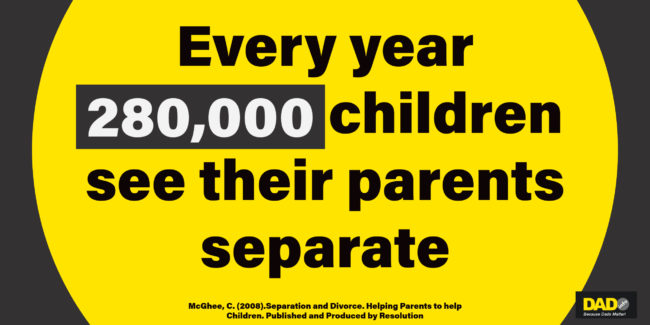
Protecting your children during family breakdown
The court system in England & Wales usually gives residency to mothers. If you are a father, this does not mean that you will not be able to spend time with your child.
Many fathers worry that the family breakdown will harm the mental health of their children. However, there are powerful ways to reduce any potential harm to the children during the separation process, especially if both parents work together to agree on a co-parenting plan.
Is time a healer?
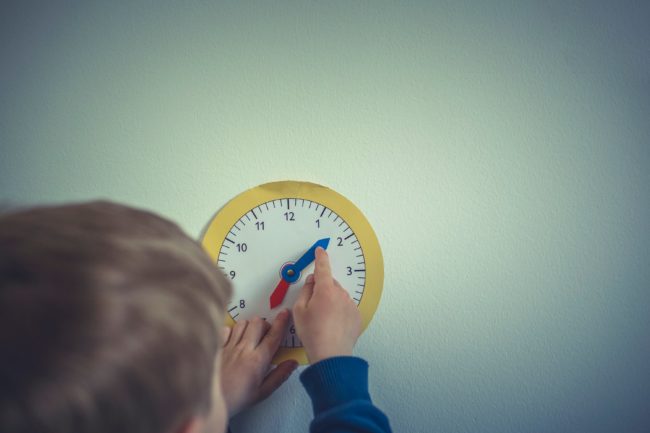
There is a common belief that children will find family breakdown difficult initially but will be fine after a couple of years once everything has settled down.
This can be true. It depends if children are parented effectively during this time. It’s a bit like when you break a leg. The doctor needs to make sure the bone is aligned correctly before allowing time for it to heal. If left untreated, a broken leg can result in permanent damage to muscles, bones, ligaments and so on.
In the same way, you and your ex-partner will need to “treat” your children with co-parenting and communication, before time can heal any mental health issues arising as a result of the family breakdown.
A breakup where the parents do not protect the children from the fights going on between them, can affect brain development so much it is actually measurable on brain scans. So although difficult, it is worth it and in our experience children in later life profoundly value the sacrifices their parents made for them at this painful stage in their lives.
The factors that affect a child’s capacity to recover from a family breakdown
In this section we look at the three main factors that can permanently harm your child’s mental health after a family breakup. These are:
- Reduction of quality time spent with each parent
- Ongoing parental conflict
- One or both parents not recovering emotionally after the break up
1. Reduction of quality time spent with each parent
How much time is spent by separated dads with their kids is not just a matter of contact. It is also about the quality of time that is used to create memories that will last forever. When we say “quality of time” it does not mean spending money on expensive outings. What it means is giving them your undivided attention.
We go into more details as to why and how in our free online course: “Parenting After Separation”.
Separated fathers should not underestimate how important it is for their children to know that they still love them just as much as before.
2. Ongoing parental conflict: how and why to minimise conflict
When a child is born they have all the brain synapses they will need as adults but the neural pathways and links are not yet developed.
The first four years of their life is as they interact with their primary carers a child’s brain develops in a way that defines how they perceive the world, and their own self-worth. This is “attachment”.
Since children’s emotional development continues throughout childhood, no child is built with the mental and emotional capacity for a parent to separate from them. As a consequence the child ‘s emotional regulation can be swept aside. They are now like a spaceship without a force field, open to be easily damaged.
Until about the age of 12, when they start to develop their own identity outside the home, children are highly likely to blame themselves for a family breakdown, and may even believe that if only they had behaved better the family would still be together, or if they behave better now that the family will get back together again.
This is why it is absolutely vital that BOTH parents make it absolutely clear that it is not their fault, and keep telling them it is not their fault. However, words alone are not enough. You will also need to put in place the building blocks of your child’s mental health. These include:
- One on one time with child-led play and conversation
- Specific and positive praise based on their qualities, not their physical attributes
- And healthy boundaries, to help them feel safe
Tweens and teens
From about twelve or thirteen our children are naturally programmed to separate from us. They will look to explore who they are, and to experiment, for example by choosing their own clothes, music, friends. From this age onwards the normal pursuit of independence becomes less a natural choice and more a necessity for survival.
Telling your children about the family breakup
If you haven’t already told your children about the breakup, it would be better if you and your soon to be ex partner:
- Tell them together
- Keep it as blame free as possible
- Be ready to answer questions your children are likely to ask such as where they will live and where they will go to school and when they can see you
- Don’t say “we don’t love each other any more” because they might think “if Daddy stopped loving Mummy perhaps he can stop loving me too”
- Tell them immediately it is not their fault. Children often believe that if only they had been better, more well behaved, that you would have stayed together.
Don’t speak badly of your ex in front of them
No matter how unfair your ex is being towards you, you cannot speak badly of each other if you want your child to grow up secure and healthy.
Home is supposed to be a place of safety for children. If their parents speak ill of the ex partner a child learns at a very early age that they can no longer share how they feel with each parent. They can even learn to say mean things about each parent to the other in order to please both. This way they are learning how to lie to their parents, which impacts their safety and security.
No matter how hard it is to hear how much your child enjoyed being with your ex it will bear tremendous fruit for your children and for you as they grow up and realise how you prioritised them over your own feelings.
It is important to practise self care at this time and to work towards recovering emotionally from the breakup. The pain and difficulties of family breakup can not be shared with your kids. But, you must share them somewhere; with friends or family or professional help- but never with your children.
The practicalities of co-parenting
Having told your children; the next step is to agree how to operate practically with your ex partner in terms of pickups, drop offs, parent evenings, holidays, presents, homework, food, and even bedtime.
You won’t have the same views on everything but try to be consistent and try to maintain contact during pickup and drop off. Try to do parent evenings together rather than oblige your child to go through parent evening twice. If you can, try to coordinate gift-giving such as one parent getting an X-box and the other getting the games.
Different parenting styles and “in this house”
You will notice differences in your parenting styles as you (and your children) enter this new world of parenting in two different households.
There are many parenting strategies which we cover in our free, online “Parenting after Separation” course.
One in particular is the “In This House” strategy. This is helpful when you and your ex-partner have different routines; especially if you are more of a stickler for discipline and you always feel like the bad cop. The “In This House” strategy depersonalises the challenges of implementing discipline and boundaries away from you to the building you are in, so the building becomes the bad cop. For example if your child says “Mummy lets me stay up til 10” you say “In this house you go to bed at 9”. This can apply to anything where you are trying to draw boundaries and routines such as around eating, or homework – anything!
3. One or both parents not recovering emotionally after the separation
Many parents do not realise that your child needs you to recover emotionally after the separation.
You have very little power over the mental health of your ex, but for your child’s sake you need to not show your own distress to your child and to seek help to recover emotionally.
It’s very hard to get to a point where you can co-parent your child until you are healthy and whole emotionally. This is why we encourage parents going through a relationship breakdown to join a divorce recovery programme such as Restored Lives, which you can find here:
Moving on after the divorce
When a relationship where children are involved comes to an end, both parents often go through the “Five Stages of Grief”. These are very well known and are described as:
Denial
Anger
Depression
Bargaining
Acceptance
It’s important to note that people don’t necessarily go through all these stages in that order, for example many people can go between bargaining and anger for a long time before finally accepting the relationship is over.
We normally associate grief with the death of someone, but we can also experience deep grief when a relationship breaks down. This can be intensely painful and can affect every part of your life, even your very sense of who you are (your identity).
Not many people realise that grief can be so intense it actually affects our brain: intense grief triggers the ancient, “fight or flight” part of our brain and causes the release of a hormone called acetylcholine. As a result of this it can make us feel very aggressive, defensive and hostile. The emotional response is actually also a biological response which is happening to us in a way we cannot consciously control.
When a relationship breaks down, it is often the case that the breakdown comes as an unexpected shock to one partner. This means that while one parent has already gone through the stages of grief, the other parent is just beginning that journey and will be going through denial, anger and bargaining when the parent precipitating the breakup has already gone through those stages.
Prioritise your own mental health
Public Health professionals in Australia have done extensive research into the most effective ways men prevent and manage depression and anxiety during difficult times – and it is significantly different from women.
They have found that for men benefit enormously by creating a structure and routine around
- prioritising tasks and keeping busy
- physical health (including a healthy diet, regular sleep and exercises)
- regular enjoyable activities e.g fishing, camping and especially team sports
- regular interaction with friends and family
- using humour to reframe the way they see a problem
- active problem solving
Men benefit from problem solving. It helps them experience a sense of achievement. Therefore CBT is a form of therapy that often works well for men since it helps them examine not only the cause of a problem but helps them look at that problem in a different way and find a plan to either fix the problem or find relief in taking some action towards fixing how they feel about it.
Psychotherapist Adam Lane Smith says of male depression that it is different from female depression; almost all experience helplessness and hopelessness.
He explains that ‘Men are evolved to have a need for a mission related to other people, to be able to accomplish tasks and goals that have meaning.’
If a man has no goal in life, or no way of achieving his goal, he can lose hope in life itself and become depressed. However if a man has a mission, especially one that relates to other people, and believes he can accomplish that mission they can overcome just about anything in service of that mission.
Fathers who do not get to see their children often enough can easily start down that path toward despair. This is when it is vital for a man to join groups of other like-minded people who have gone through the same thing and who may be able not only to provide support but also to provide a sense of “you are not alone” and advice from people who have survived the journey that you are just now walking.
Resources for support post split:
| https://www.dad.info/forum | Moderated online forum where fathers, separated or not, support each other |
| 08457 909090 www.Samaritans.org | Samaritans 24-hour support helpline |
| https://www.restoredlives.org info@restoredlives.org | Restored Lives Provides courses to help people get through divorce and separation |
| www.mentalhealth.org.uk | Mental Health Foundation Information on all aspects of mental health issues, including addiction and substance abuse. |
| 0300 123 3393 mind.org.uk | MIND Mental health charity with a range of online support and information, including an information line and a legal advice service. |
Dealing with Addiction:
| www.gamblersanonymous.org.uk | Gamblers Anonymous Offers advice for compulsive gamblers and their families. |
| 0845 769 7555 or 0800 917 7650 www.alcoholics-anonymous.org.uk | Alcoholics Anonymous Help for people who think they have a problem with alcohol. |
| 0300 123 1110 www.drinkaware.co.uk | Drinkline Help to callers worried about their own drinking and support to the family of people who are drinking. |
Financial support from the government
For help in finding out what benefits you and/or your ex can claim How to check what benefits you may claim go here:
| Benefit name | Where to find out about it |
| Job Seekers Allowance/Income support | https://www.gov.uk/jobseekers-allowance |
Universal Credit | https://www.gov.uk/government/publications/universal-credit-and-you/draft-uc-and-you |
| Working Tax Credit (if you work 16 hours/week or more) | https://www.gov.uk/government/organisations/hm-revenue-customs/contact/tax-credits-enquiries |
| Child Benefit | https://www.gov.uk/child-benefit |
Child Tax Credit | https://www.gov.uk/child-tax-credit |
| Council Tax Reduction | https://www.gov.uk/find-local-council |
Child Benefit
Remember you can claim child benefit for all your children.
If you have joined households and now have more children living together, then the eldest is entitled to £21.15 per week and all subsequent children in your household will be paid at £14 per week.
If you have split with your ex, and one child is living with you and another child is living with your ex, he benefit is paid at £21.15 for each child.
Only one partner can claim the benefit per child.






